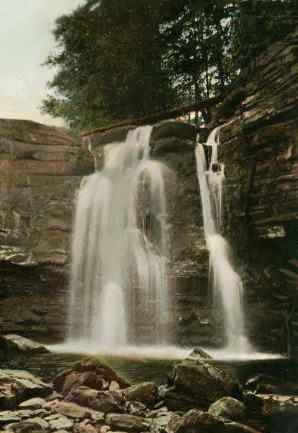|
"Lynneage" on
CD!
The original hard-bound volume "Lynneage - The
Lynns, Linns, and Linds of Scotland and Ulster"
is
out of print.
However, a new edition, including substantial new research,
is now available
on CD for either Ulster, a specific region of
Scotland,
OR the entire historical/genealogical collection concerning
Lynns, etc. in Scotland and Ulster.
"Lynneage" includes the following variant spellings:
Lean, Lein, Len, Lena, Lenna, Lennie, Leyne,
Lin, Lind, Line, Linn,
Linne, Linnie, Lyn, Lynd, Lyne, Lynn, Lynne, and Lynny
with a few occurrences of Lindesay and Lyndesay
(See
About Surnames
to understand the inconsistency of name spelling in historical records.)
"Lynneage - The Lynns, Linns, and Linds of Scotland and Ulster"
Book Description
ENDORSEMENTS
EXCERPT:
|
Ayrshire was the location of an old family of Lynns who dwelt near what
Paterson described as a “beautiful natural cascade on the Water of Caaf, near to
which stood the ancient castle of Lin”. While geography often generated
surnames when surnames came into use, in this case it was mere coincidence.
This
family, a root of unnumbered branches, was named de Lyne long before arriving
in Ayrshire. While their barony and fortalice sometimes were called Lin or
Linn, it is Lynn which came to be the accepted form of the family name in
Ayrshire.
Nineteenth-century Scottish historians Paterson
and McKerlie believed that Walter de Lynne, signer of the 1296 Ragman Roll, was
the ancestor of this family. It has also
been suggested that, in their earliest days, the Lynns were vassals of the de
Morvilles. The 1852
Imperial
Gazetteer of Scotland
relates instead that: (1) the Lynns were kinsmen of the English baron Hugh de
Morville; (2) de Morville was allied with King David I, participated in the 1170
slaying of Thomas à Beckett, fled to Scotland, and was granted the lands of
Dalry; and (3) Walter Lynn, first of the family in Ayrshire, inherited the
barony of Lynn from Hugh de Morville.
Direct ownership is proven by the language used to describe the Lynns and
their holding of the barony. First, they
bore the title “of that ilk”, and the right to be so called was granted only by
royal charter. Second, they were also
described as “lords” or “lairds”, which in turn indicates a holder of land directly
from the king and not through an overlord.
|

Lynn
Falls in Dalry, Ayrshire
Courtesy of
Armour Hamilton
|
|